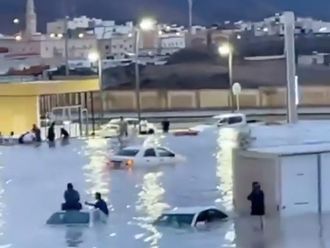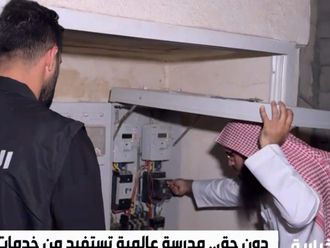Donetsk: The Ukrainian government accused pro-Russian separatists on Sunday of threatening a tenuous push for peace as booming rounds of heavy artillery fire echoed across the insurgent stronghold of Donetsk.
It said the rebels were intensifying their attacks on government positions in eastern Ukraine despite a ceasefire backed by Kiev and Moscow nine days ago.
“The terrorist actions are threatening the realisation of the Ukrainian president’s [Petro Poroshenko] peace plan,” said National Security and Defence Council spokesman Volodymyr Polyovy.
He also took aim at comments by two rebel leaders who both signed the 12-point truce deal in Minsk on September 5, but who declared on Sunday they were mere “observers” at the talks.
AFP journalists reported the sound of explosions and incessant mortar fire near Donetsk airport where the Ukrainian military said it had driven back a major assault by insurgent fighters on Friday.
The ceasefire deal has helped calm five months of fighting that killed more than 2,700 people and set off the worst crisis in East-West relations since the Cold War.
Rebels and government forces have since swapped dozens of captives and had conditionally agreed to exchange 65 more prisoners from each side later on Sunday.
But the simmering crisis has exposed layers of mistrust between both the West and Moscow and between the largely Russian-speaking populations in the east of Ukraine and the pro-Western leaders in Kiev that may take years to mend.
Ukrainian Prime Minister Arseniy Yatsenyuk accused Russian President Vladimir Putin on Saturday of deliberately keeping Ukraine in a state of war to create a “frozen conflict” in Russia’s backyard.
“He wants to eliminate Ukraine as an independent country,” Yatsenyuk told an international forum in Kiev. “He wants to restore the Soviet Union.”
The West has been acting to isolate Putin, now acting in a much less predictable and more aggressive manner than at any point since his domestic domination began 15 years ago, and in turn pledged greater support for the pro-Western leadership in Kiev.
The truce halted a rebel counter-surge mounted across the south-east last month with the alleged support of hundreds of Russian paratroopers, although Putin has repeatedly denied any direct involvement in the conflict.
But insurgents continue to stage periodic strikes on Donetsk airport and areas in the neighbouring separatist region of Lugansk, government officials said.
Russia on Saturday sent a 220-truck convoy it said was carrying aid to the residents of rebel-held Lugansk, who have been struggling without basic supplies, water and power for weeks.
Ukraine — which did not give permission for the convoy to cross — had expressed fears the trucks may be carrying supplies for insurgent and bitterly protested a similar delivery last month.
The peace deal, however, has failed to provide respite for Poroshenko, a veteran politician and business baron who won a May election on a promise to crush the rebellion and keep the ex-Soviet nation whole.
Cracks in his government emerged on Sunday when Deputy Foreign Ministry Danylo Lubkivsky resigned over a delay in the implementation of a historic EU trade deal, apparently under Russian pressure.
The postponement of the deal until the end of 2015 “sends the wrong signal to everyone: the aggressor [Russia], our allies and — most importantly — Ukrainian citizens,” Lubkivsky wrote on Facebook.
The deal was meant to revive Ukraine’s economy by lifting EU trade barriers, but Russia feared it would see its own market flooded with cheaper EU goods.












